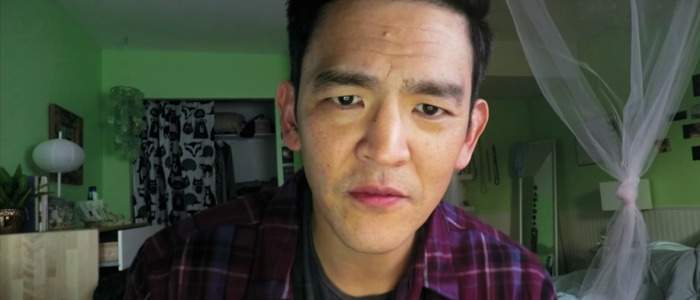'Searching' Is The First "Computer Screen Movie" Where The Internet Isn't The Villain
Most teenagers would rather die than submit to their dad going through their entire laptop, contacting all of their friends and watching their private videos. But Margot Kim isn't most teenagers. In Searching, David (John Cho) plays a recent widower whose daughter goes missing overnight. Detective Rosemary Vick (Debra Messing) volunteers to take on the case, but David can't remove himself for the investigation, so he starts his own inquiry on his laptop and eventually logs into his daughter's computer.But as the film proves, the computer is only as smart as the person who uses it – you have to know what to type in the search bar. In that way, modern technology is neither a force for good nor evil. It's a tool.Spoilers for Searching begin here.
Screenlife
Weigh out all the pros and cons of modern technology all you want, but you can't argue with how much it's affected every single aspect of our lives. Cinema has tried to capture that in varying degrees of success. It was only a matter of time until technology became the lens.That's when Hollywood director Timur Bekmambetov shows up. He's the creator of a genre he calls "Screenlife," films that take place entirely on computer screens. So far, mostly thrillers and horror films have had the screenlife treatment, but if Bekmambetov has his way, it won't be long before "desktop dramas" emerge from the fringes to become a mainstream genre. All you need is a laptop and the Screenlife software that Bekmambetov developed. It eliminates a lot of the time-consuming traditional techniques that happen when filmmakers depict people using technology. Instead of doing a 'shot/reverse shot' and showing a screen and cutting to an actor's reaction, Screenlife compresses the two into one frame. You can see action and reaction simultaneously.Searching opens with the creation of two accounts on Windows PC: Pamela and David Kim. It's the beginning of a montage that echoes the heart-wrenching montage of Up (which also happens to function as a barometer of whether someone has the capacity for emotion or not). We are shown a compilation of iPhone videos, calendar events and appointments that illustrate Margot's upbringing and Pamela's illness. It's a clever technique, but it hinges on how each audience member responds to the sentimentality. Because the montage is created for our eyes only, it lacks the spontaneity of many of the other scenes in the thriller. It's clever exposition, but still feels a bit forced.A more poignant moment is when David logs back into the now deceased Pamela's account and a Norton Antivirus notification pops up saying that it's not been renewed in '694 days'. It's a cobweb in a bygone room. Is it frightening or comforting that our devices can outlive us?Despite the formal invention, the film's perspective jumps around too much to feel like a true Screenlife film. With the montage at the beginning and the cuts to hidden cameras and TV coverage in real-time, the confinement to a computer screen feels unnecessary. Because we are not sharing a perspective with anyone unlike in the rest of the film, they end up feeling disembodied. Eventually, the dedication to the form sometimes feels like a gimmick.
Digital Milk Carton
And yet, what the film does do well is capture the way that the internet engages with crime cases gone viral. #FindMargot starts trending on Twitter, and the sinister cynics start their own hashtag: #DadDidIt. It reveals the hypocrites that post and vlog about their 'best friend' Margot, and of course the assholes who make light of her disappearance. And despite the harrowing premise, the film does find a great deal of humour by way of David's general ignorance of internet culture ("What's a tumbler?" he asks Margot's classmate at one point).The bulk of the film is essentially David getting to know his daughter without actually spending anytime with her. He finds out that she hasn't been taking piano classes for the past six months even though he's continued to give her $100 money every week to cover the cost. He learns that Margot is much better at making him believe that she has friends than at actually making them. Yet despite these revelations, the film does not support the claim that internet self and the off-internet self are radically different. His instincts about his daughter are right.
Searching the Internet
The internet of Searching is not one of trap-doors and infinity mirrors. All the information that David needs to solve his daughter's disappearance is there from the start. Like in all good thrillers, it's entirely contingent on how you contextualize the information. It's less digging deeper than it is assembling a puzzle. The allegory serves as an important distinction, because in other Screenlife films a lot of the narrative tension comes from the data crumbs that we leave behind without realizing it or knowing what to do. These films traffic in post-Snowden paranoia and anxiety. We know everything we do on our computers and phone (or even just near them!) is being registered and monetized in some way. But Searching doesn't engage with that kind of fear. It's much less political than that. If there is a fear that her online presence is entirely constructed, than the film resolves that (to the relief of many parents watching, I'm sure).The film's main fear is how easy it is to rely on technology for emotional fulfillment at the expense of our "real-life" relationships. David and Margot's father-daughter arc ends with them being able to communicate more openly with one another about her mother's death. At the beginning of the film, David types "Your mother would be proud of you," but on second thought, he deletes it. By the end, he's able to send it. Again, how you react to this will depend entirely on how much of a soft-spot you have for neat resolutions to harrowing ordeals.Searching would proport that technology is ultimately a democratizing tool. As long as you have internet access and know how to navigate a laptop, you can solve a whole kidnaping case. When David discovers that Detective Vick has ulterior motives, his innate distrust of authority ends up saving his daughter's life. All the information he needs is on his daughter's laptop, so the access and legitimacy that Detective Vick has is just a decoy. This is a very different perspective than the Unfriended films, which cast the supernatural and the super skilled as the villains. No amount of tech savvy will save yourself because the bad guys will always have the upper hand.Ultimately, Searching is an accomplished missing-person's drama which just so happens to take place on screen. It's well-conceived in its premise and fleshed-out characters. Even if it misses the opportunity to break away from the conventions of the thriller genre, the film does good by showing how the landscape has changed thanks to the internet. This is a neutral force, one that can be used for good or evil.



